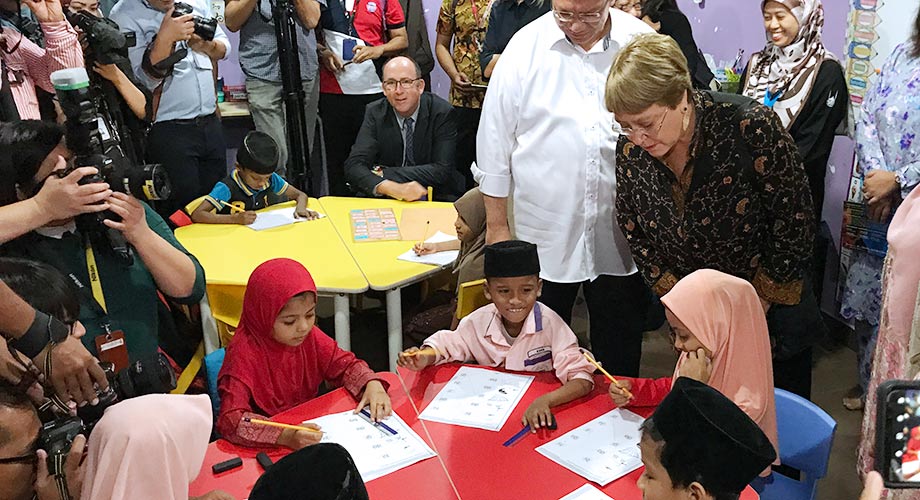Rohingya Refugees and the Right to Education

KUALA LUMPUR, Malaysia (15 October 2019) – Zakir was just 11 years old when his parents told him their family was going to have to flee the only home he had ever known.
Security forces in Myanmar’s troubled Rakhine State had carried out a wave of killings against Zakir’s ethnic Rohingya minority, “and the only way out,” he said, “was by sea.”
Together with his family, the young teen walked on foot for seven days to the coast, where
he boarded a huge wooden vessel packed with over 1,000 Rohingya refugees.
During the weeks-long voyage that followed, there was little food and water, and quarrels broke out. At least 30 passengers died, he said, many of them swept overboard by steep waves.
After a brief stop in Thailand and another short boat trip, Zakir finally reached Malaysia, a country that has given refuge to tens of thousands of Rohingya hoping for better lives.
But Zakir’s new home presented new challenges he had never faced before: he didn’t speak the local language, and he had no access to education because public schools in Malaysia are reserved for Malaysian citizens, not refugees.
In 2017, though, he got the chance to attend a just-launched “alternative learning centre” called the Rohingya Integrated School of Excellence, or RISE.
The UN High Commissioner for Human Rights Michelle Bachelet visited the centre during what was the first-ever official trip conducted by a UN rights chief to Malaysia.
Her country visit offered a chance to call attention to the challenges faced by refugees – a subject Bachelet knows well. “Everyone has the right to education,” Bachelet tweeted shortly after visiting the Rohingya centre, echoing the words of the Universal Declaration of Human Rights, which was adopted by the UN General Assembly in 1948. “Everyone,” she said, “deserves the chance to learn skills to build a better future.”
For students like Zakir, such rights are critical.
Some of RISE’s students had reached the age of 12 or 13 without being able to read or write, said Noor Halimahton of Islamic Relief Malaysia. But “if we can help them get a basic education, at least they can survive, and have the chance to escape poverty,” Noor said.
“We do believe there’s hope for these kids,” Noor said.
RISE, which has seven teachers and 41 students aged seven to 15, offers subjects ranging from English and science to mathematics and art. It’s also offering refugees a chance to think and dream big.
Asked what he wants to do when he grows up, Zakir doesn’t miss a beat: “I want to be a scientist, or an astronaut.” Asked why, he replies simply: “Because I want to protect the Earth.”
The future, though, is bleak even for children who are lucky enough to attend alternative learning centres, because they cannot legally work in Malaysia when they reach adulthood. And although many hope to gain asylum in a third country, most students at RISE came from families that have already been living in Malaysia for two or three generations.
The real question is, “what happens after they complete their education here?” Malaysian Foreign Minister Saifuddin Abdullah said after touring the Rohingya centre with Bachelet, adding the government was analysing the possibility of offering accreditation to graduates to enable them to enter local or foreign universities.
During a press conference in Kuala Lumpur, Bachelet said she hopes Malaysia will ratify the 1951 Refugee Convention, which outlines the rights of the displaced.
She also said she hopes “the legal recognition of refugees can be strengthened and the right to education and access to the job market can be ensured for all.”